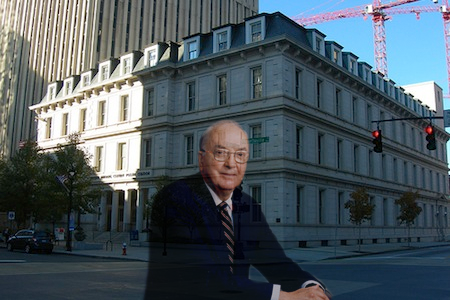Does Jesse Helms Deserve to Have a Courthouse Named After Him?

Should this building be named for this man? Credit: Flickr/Wiki Commons/HNN staff.
Last week, North Carolina Congresswoman Renee Elmers introduced a bill to rename a historic federal building in Raleigh in honor of longtime Senator Jesse Helms.
The liberal advocacy group Progress NC was among those first into the fray against the “Jesse Helms Federal Building,” launching an online petition drive against the re-naming. It has close to 7,000 signatures and is growing fast. The story is attracting news coverage from across the country.
I received a copy of the petition in an email from a group of progressive North Carolina university scholars with whom I share many interests. Though it might shock some of my liberal and progressive colleagues, I’m not sure I’m going to sign that petition.
Why not? It’s not because I would have cast my ballot for Jesse Helms if I were voting in North Carolina forty years ago.
Helms was, in fact, an opponent of the expansion of rights and freedoms in this state and this country, as the petition argues. Helms was a direct precursor to Rush Limbaugh in divisive, firebrand right-wing rhetoric. As the conservative movement grew during the 1970s, “Senator No” threw sand in the gears rather than make efforts to move things forward.
My reservations about the re-naming come from the fact I’ve worked in politics, studied it, and agree with German Chancellor Otto von Bismarck when he said famously that it is a messy business, “like making sausages.” Politicians are among the least trusted of all professionals, in large part because they often change their views. (Mitt Romney paid the price for this perception last month.)
But shouldn’t we applaud our leaders who evolve? Who have the courage to say they were wrong, realize it, and act on it? Let’s not forget that some of our state’s liberal heroes changed their views, too. Senator Sam Ervin, hero of the Watergate hearings, changed his mind about the monumental desegregation case Brown v. Board of Education. He initially opposed that ruling, along with every single civil rights bill during that came before him during his twenty years in the United States Senate.
We don’t write off Sam Ervin because of those ugly views. I walked by a plaque in his honor every day I taught at N.C. State.
Jesse Helms changed, too. In his last years he reversed his longstanding stance against foreign aid and AIDS prevention in particular. This was a large step for a man of the old South, and one which carried genuine policy consequences that resulted in actual changes for the lives of many overseas.
Political contradictions and offensive hypocrisies litter our country’s history. The progressive author of our Declaration of Independence, who believed all men to be created equal, owned slaves. The mother of his children was one of them. A later progressive hero, Woodrow Wilson, screened the offensive and racist film Birth of a Nation at the White House.
I don’t stand with those like leftist Professor Howard Zinn, or to a lesser extent filmmaker Oliver Stone, who in his current cable television series “Untold History of the United States” seeks to correct what he views are the fatal flaws and cover-ups of the traditional story of American history. To Zinn and Stone, American history and its memorialization leaves out too many nasty chapters.
I’d say the best thing we can do is not rewrite history from the left or right, but acknowledge it for what it is. And, I dare say, focus on the positive. That, it would seem, is progressive.
Senator Sam Ervin opposed civil rights. He also became a champion of civil liberties and heroic prosecutor of the Watergate scandal.
Senator Jesse Helms opposed civil rights. He also changed his mind about the moral need for rich nations to aid poor ones, particularly when faced with devastating epidemic disease.
Maybe, give him his building plaque just for that.
I’d actually be more likely to oppose the re-naming because the building in question, the Century Post Office and Courthouse on Fayetteville Street, was the first building project undertaken by the federal government after the Civil War. I can’t imagine Senator Helms would have supported that undertaking had he been in Congress in the 1860s.
Perhaps we could take Bismarck’s advice and make some sausage: Find another courthouse.
